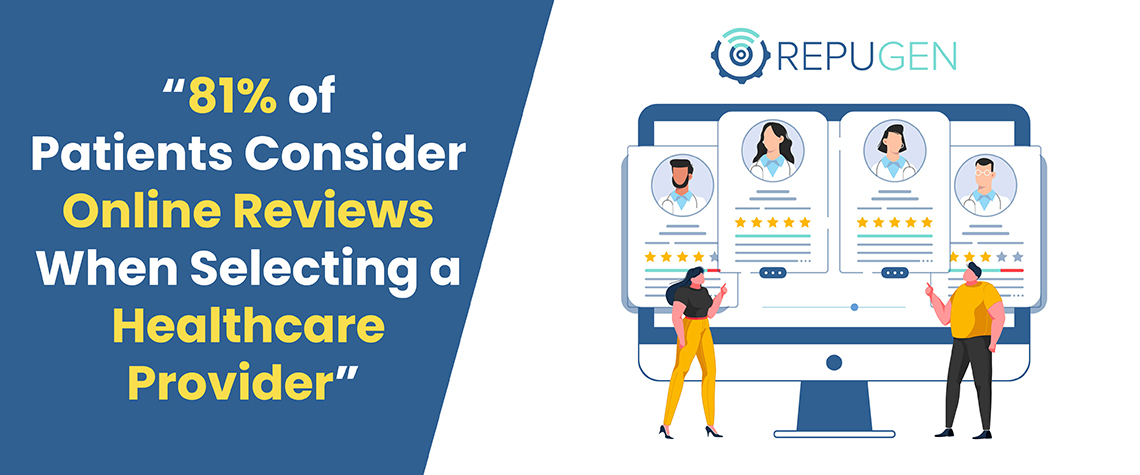With every passing year, patients increasingly rely on online reviews when selecting a healthcare provider.
We surveyed over 1700 respondents across the U.S., and found that several factors (review platform, number of reviews, age and relevance of online reviews, etc.) play a crucial role in determining the overall credibility of the online reviews and how patients use online reviews to select a provider.
Table Of Contents
- Do Patients Consider Online Reviews When Selecting A Healthcare Provider?
- How Important Are Online Reviews When Making A Healthcare Decision?
- How Important Are Positive Patient Reviews And High Average Star Ratings When Choosing A Healthcare Provider?
- What Are The Most Important Review Factors For Patients?
- What Is The Minimum Star Rating Required To Be Considered By Patients?
- How Many Review Platforms Do Patients Visit While Evaluating Healthcare Providers?
- Do Patients Leave A Negative Review/Feedback For Healthcare Providers?
- What Factors Are Primarily Responsible For Negative Feedback?
- Do Healthcare Providers Respond To Negative Feedback And How Satisfied Were Patients With Their Response?
- How Satisfied Were The Patients With The Way The Practice/Providers Handled Their Feedback
- Which Online Review Sites Do Patients Check For Healthcare Providers?
- Which Review Site Do Patients Trust The Most?
- How Likely Are Patients To Consider Providers Without COVID-19 Health And Safety Measures In Place?
- Has COVID-19 Affected The Frequency Of Patients’ Visits To Their Healthcare Providers?
- What Holds More Weightage- The Doctor's Online Review, The Practice's Review, Or Both?
- How Likely Are Patients To Write Reviews For Their Healthcare Providers?
- How Many Patients Expect To Receive A Response To Their Review And What Is The Expected Time Frame Of Receiving A Response?
- What Are The Modes Of Communication Preferred By Patients While Contacting Their Providers?
- Has COVID-19 Affected Patient's Review Consumption Habits?
- Does The Age Of Review Affect Its Relevance?
- At What Age Is A Review Not Relevant For Patients?
- What Is The Minimum Number Of Reviews That Patients Check Before Selecting A Healthcare Provider?
- What Are The Top 3 Most Important Factors When Selecting A Healthcare Provider?
The Key Statistics from the Survey
- 81% of patients consider online reviews when selecting a healthcare provider. This is a 2% increase over 2020.
- 40% of patients will not visit a provider with poor reviews. This is a 10% increase over 2020.
- Sentiment expressed by patients’ comments, star rating, and the total number of reviews are the 3 most important aspects of online reviews evaluated by patients in their decision-making process.
- 75% of patients would only consider healthcare providers/practices with a minimum star rating of 4 stars or more.
- More than 69% of patients visit 2 or more review platforms while selecting their practice/provider.
- Google, WebMD, Healthgrades, and Yelp continue to be the most trusted review sites, in the same order.
- 80% of the patients find that a review’s age affects its reliability, with more recent reviews being more reliable.
- More than 50% of patients would not trust a review that is older than a year.
- 60% of patients check 10 or more reviews before deciding on a healthcare provider.
- Quality of care received and the provider's demeanor are the top 2 reasons for patient dissatisfaction and negative feedback.
- More than 60% of patients do not leave any negative feedback for their providers.
- More than 50% of providers respond to patients' negative feedback, and about 65% of patients are satisfied with the response received. However, only 10% were satisfied with the way the provider handled their feedback.
- Only 44% of patients write a review for their healthcare practice/ provider.
- More than 90% of the patients who expect a response to their review expect it within a week
- E-mails, phone calls and text messages are the 3 most preferred modes of communication among patients, preferred in that order.
- Three of the most important factors used by patients in evaluating a potential healthcare provider are online reviews, referrals from another medical professional, and referrals from family/friends.
The RepuGen Patient Survey 2021 - Read on to get detailed insights on:
- How effective are online reviews in influencing the patient's selection of healthcare providers
- Key factors/characteristics of reviews used by patients in making a decision
- Minimum star ratings required by a healthcare provider to be considered by patients
- Review sites that are checked and trusted by patients
- Average number of reviews checked before making a decision
- Other important factors that affect the patient's selection of healthcare providers
Patient Review Habits
Do Patients Consider Online Reviews When Selecting a Healthcare Provider?
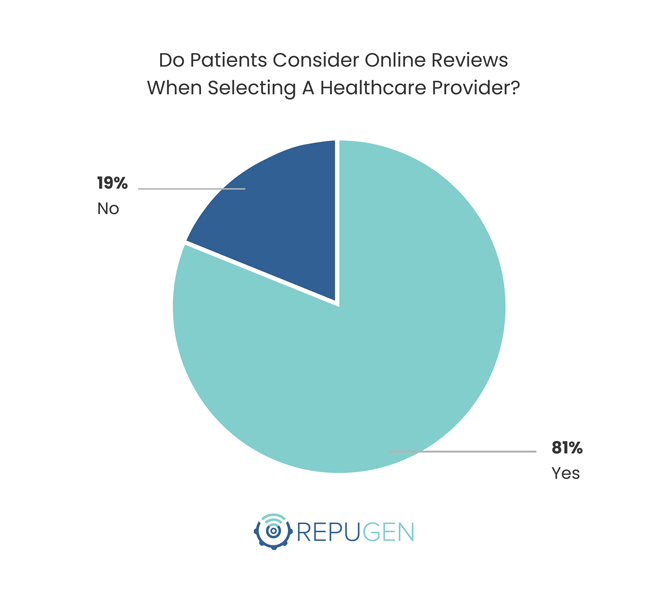
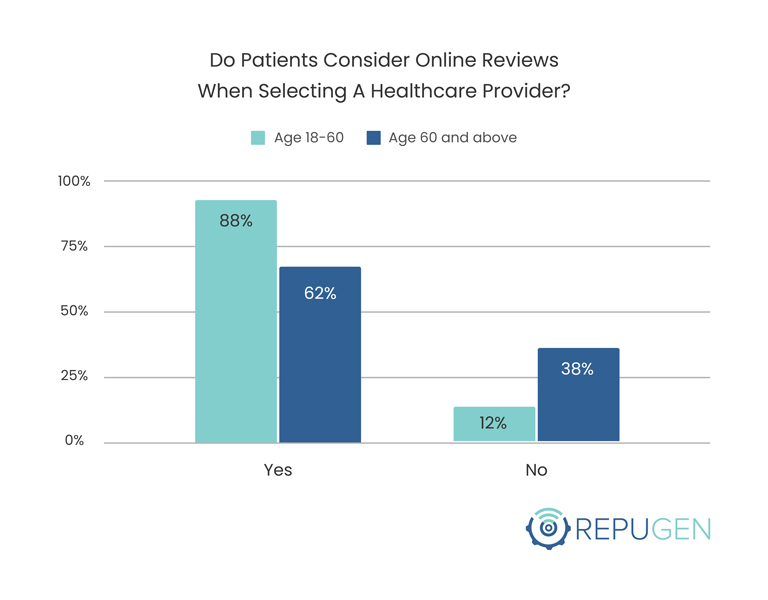
Key Findings
- Overall, over 80% of patients check online reviews when selecting a healthcare provider.
- Online reviews are, comparatively, not as important among the older population; 88% of patients under age 60 check reviews when selecting a healthcare provider vs. 62% of patients above 60.
However, the overall % of patients who check reviews while selecting healthcare providers has increased from 2020 by 5% for those under 60 and 3% for those above 60.
These key findings show the importance of checking online reviews of healthcare providers before choosing one. The reviews help patients feel confident that they are making informed decisions about their healthcare.
How Important Are Online Reviews When Making a Healthcare Decision?
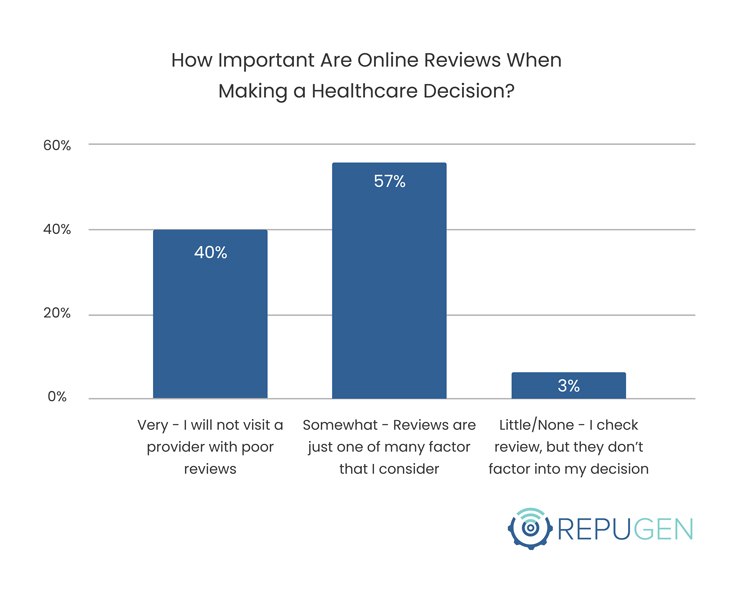
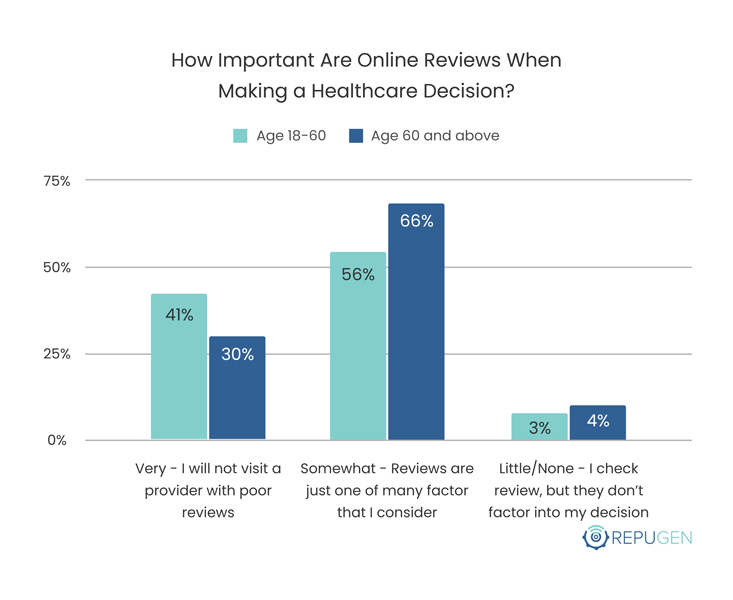
Key Findings
- Managing online reviews continues to play a crucial role in a provider decision for many patients as 40% of patients refuse to select a provider with poor reviews, an increase of 10% over 2020. Meanwhile, only 3% of patients don’t use reviews in their decision-making, a significant drop compared to 14% in 2020.
- The importance of reviews among older patients is growing as well, with 30% of patients above 60 refusing to select a provider with poor reviews. This is a sharp increase of 11% from 2020.
The data shows that online reputation management for healthcare providers is crucial. When the reviews are not managed, the actual patient satisfaction level will not be accurate as it will only capture a skewed perspective of a few unsatisfied patients.
How Important Are Positive Patient Reviews and High Average Star Ratings When Choosing a Healthcare Provider?
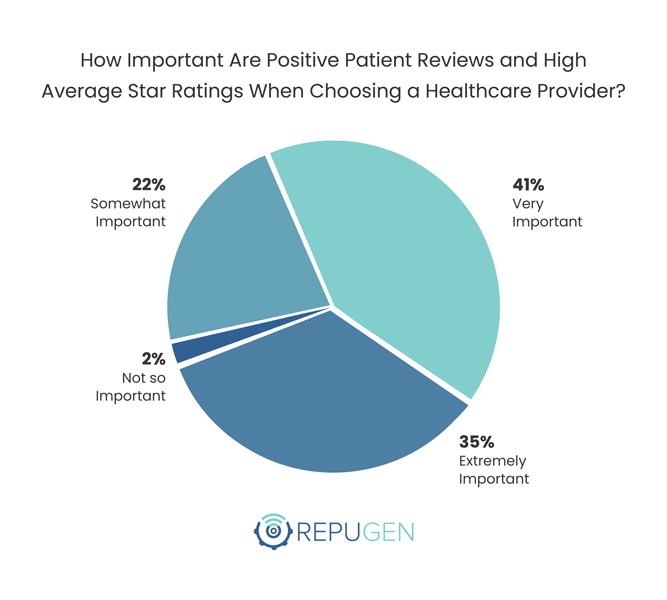
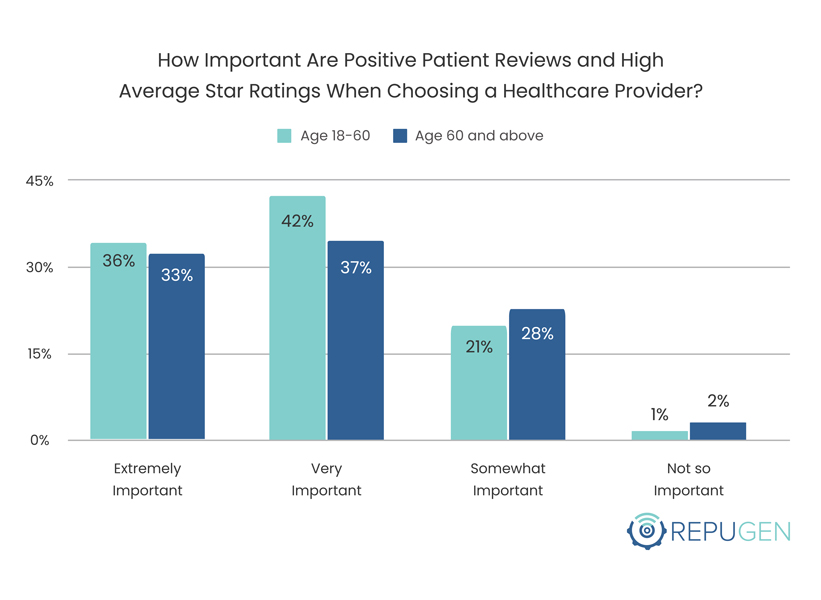
Key Findings
- Positive patient reviews and high average star ratings are important to 98% of patients when choosing a doctor or dentist.
- 70% of patients ages 60+ and 78% of patients under 60 regard positive patient reviews and high average star ratings to be crucial in selecting their healthcare provider.
The data shows that a positive patient review and a high average star rating are important to patients when selecting a provider.
What Are the Most Important Review Factors for Patients?
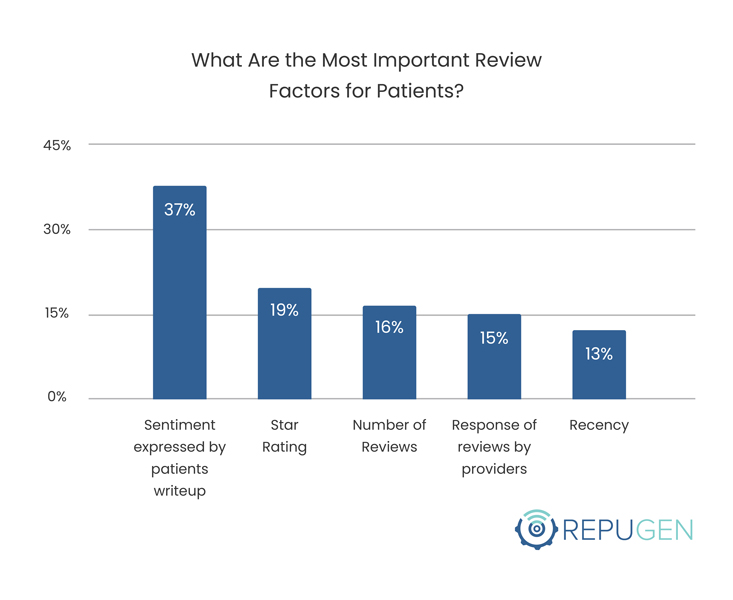
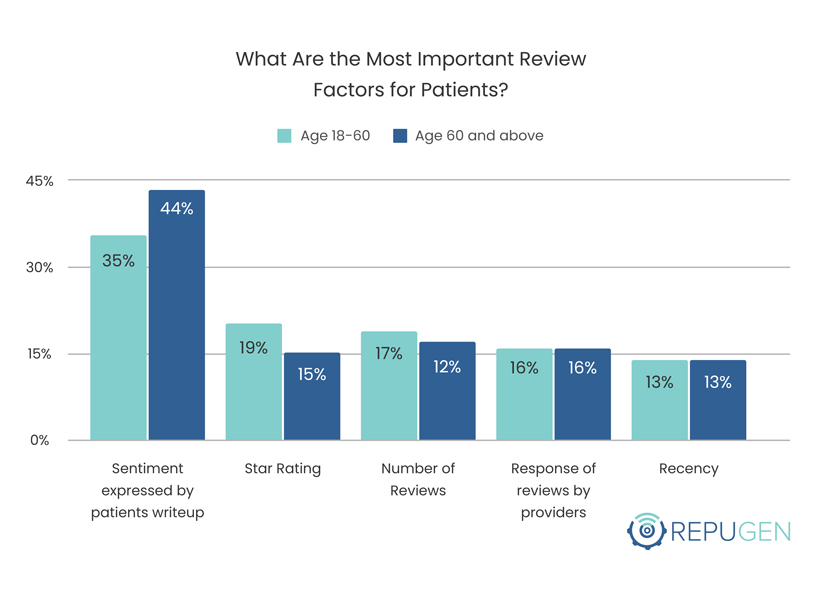
Key Findings
- Sentiments expressed by patients’ feedback, star rating, and number of reviews were cited as the most important factors of reviews when selecting a healthcare provider.
- Older prospective patients give patient feedback more consideration than those below 60 years of age.
- Star rating and the number of reviews were given more importance by the younger population.
This shows the aspects of an online review that are most important to patients when selecting a healthcare provider and how they value these factors.
What Is the Minimum Star Rating Required to be Considered by Patients?
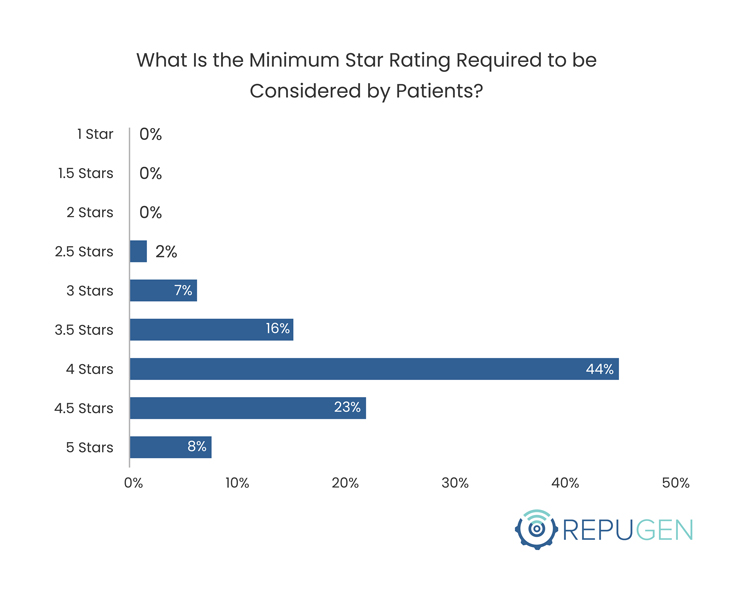
Key Findings
- 75% of patients said they would consider a healthcare provider/practice only if it had a at least a 4 star rating.
- 25% of patients would not select a healthcare provider/practice with a minimum star rating of 3.5 stars or less.
This data shows that star ratings are important when selecting a healthcare provider/practice as the patients strongly associate the providers' rating to their reputation.
How Many Review Platforms Do Patients Visit While Evaluating Healthcare Providers?
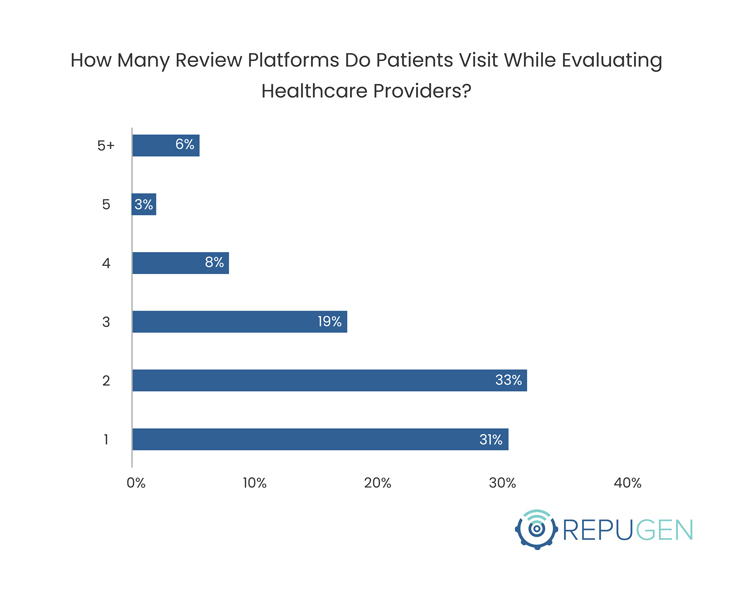
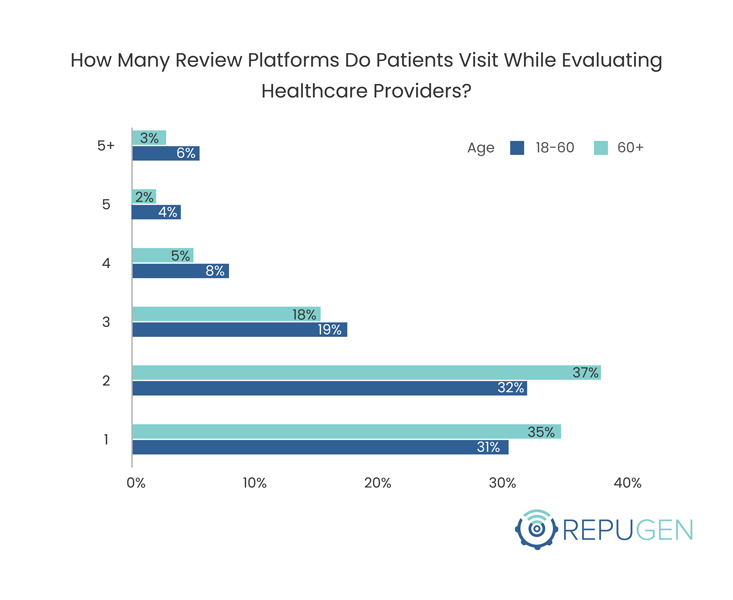
Key Findings
- 69% of patients visit 2 or more review platforms when evaluating a healthcare provider.
- 65% of older patients (aged 60 and above) and 69% of younger patients (under 60) visit 2 or more review platforms when evaluating a healthcare provider.
This shows that the majority of patients of all ages visit more than 2 review platforms when evaluating a healthcare provider.
Do Patients Leave a Negative Review/Feedback for Healthcare Providers?
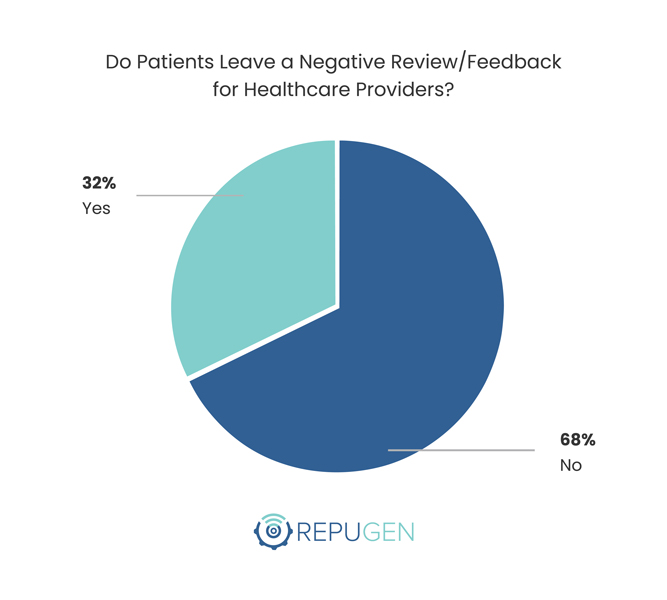
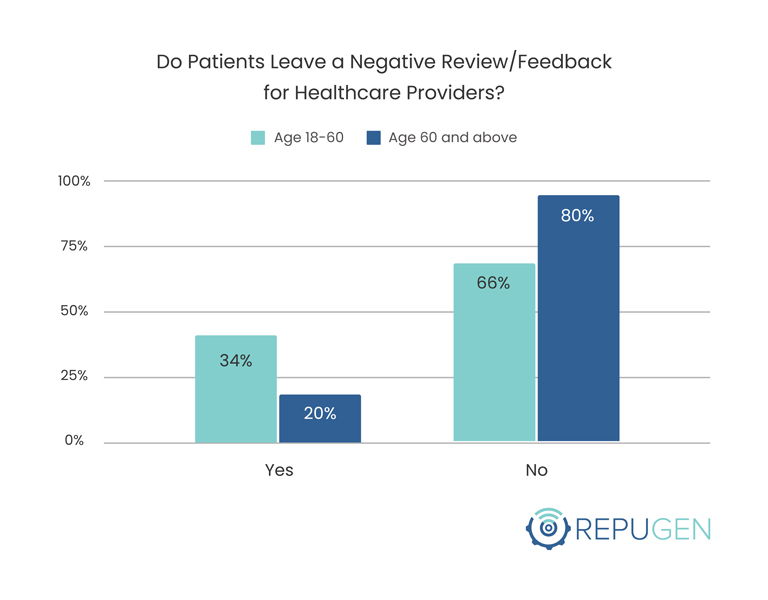
Key Findings
- 68% of patients have not left a negative review/feedback for a healthcare provider/practice.
- The younger population is more likely to leave a negative review/feedback for a healthcare provider as more than 30% of younger patients leave a negative review compared to only 20% of older patients.
This shows that since most patients have not left a negative review, many healthcare providers’ reviews do not represent their actual patient satisfaction. Meanwhile, the younger patients are more likely to voice their dissatisfaction than the older ones.
What Factors Are Primarily Responsible for Negative Feedback?
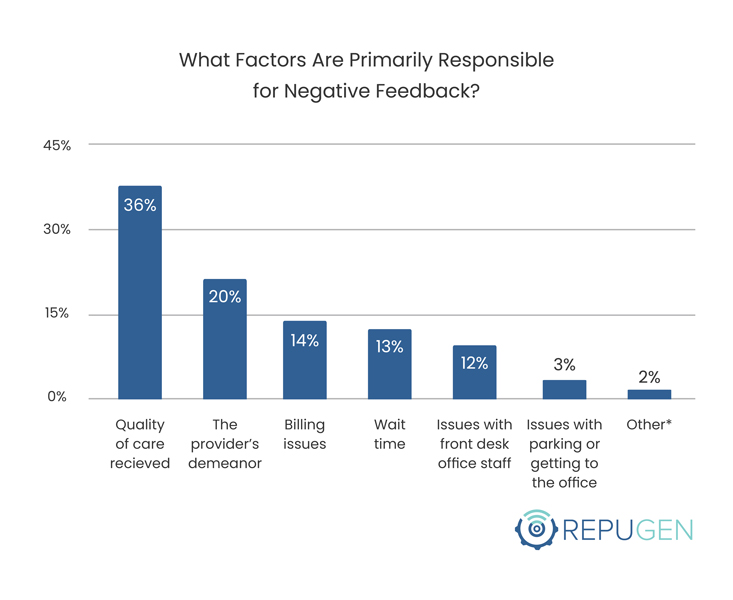
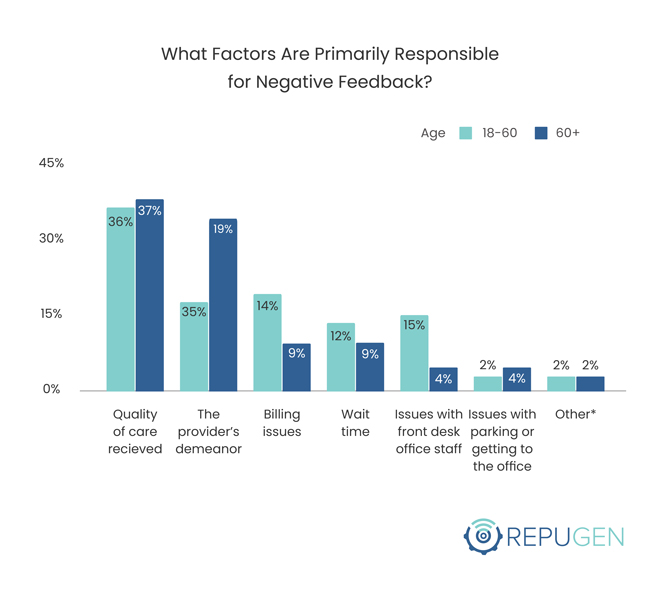
Key Findings
- Quality of care received, the provider's demeanor, and billing issues are the top 3 reasons for patient's negative feedback.
- Quality of care received is the main reason for both age groups leaving negative feedback.
- While the provider's bad demeanor gathered more negative reviews from those above 60 (35% vs. 19%), billing issues led to more negative feedback from the younger population (15% vs. 4%).
The data illustrates the main reasons for patients leaving negative feedback and what affects the different age groups.
Do Healthcare Providers Respond to Negative Feedback and How Satisfied Were Patients with Their Response?
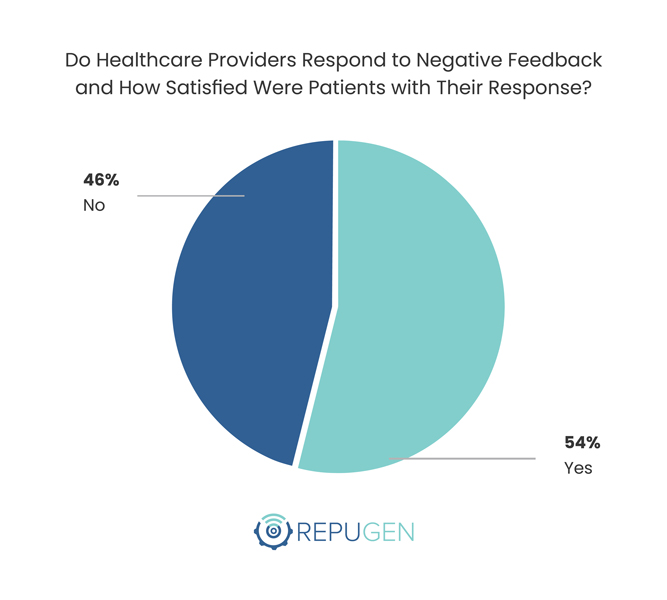
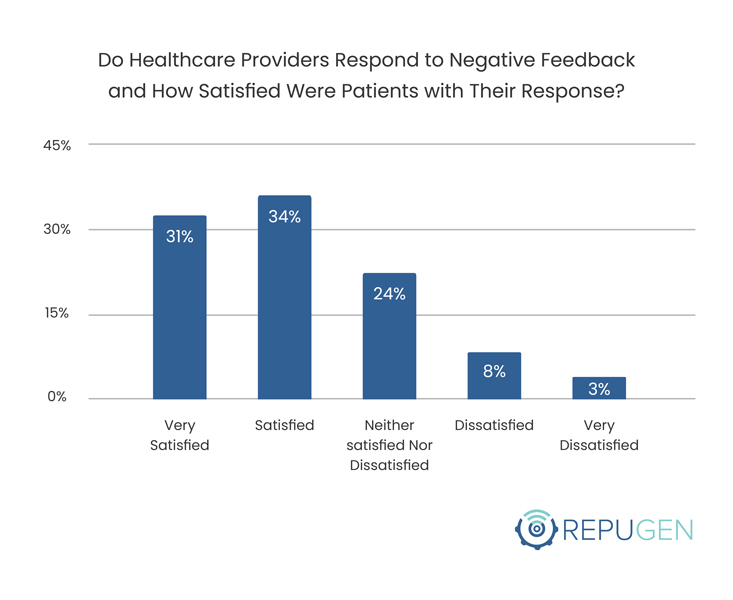
Key Findings
- Over 50% of the patients that left negative feedback said that the practice responded to their feedback.
- 65% of patients were satisfied with the response.
- 11% of patients were dissatisfied with how the practice responded to their feedback and 24% were neutral to their response.
The data reinforces how important it is for providers to manage negative feedback and shows the patients’ level of satisfaction to the practices’ responses.
How Satisfied Were the Patients with the Way the Practice/Providers Handled Their Feedback
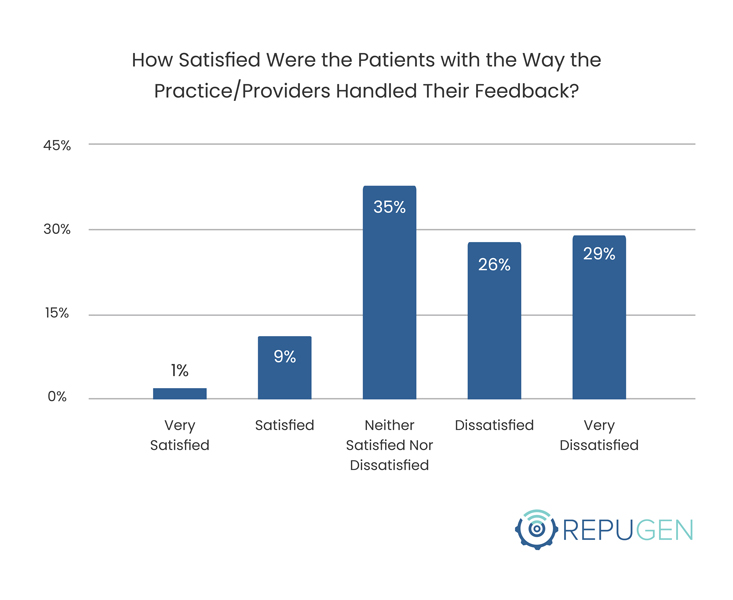
Key Findings
- 55% of patients were dissatisfied with how the practice handled their feedback.
- Only 10% of patients were satisfied with how the practice handled their feedback and 35% were neutral.
This data reveals a sharp contrast between the level of satisfaction experienced by patients in the way their feedback is responded to and the way the feedback is handled/resolved. While most of the patients were happy with being responded to, only 10 % were satisfied with the resolution.
Which Online Review Sites Do Patients Check for Healthcare Providers?
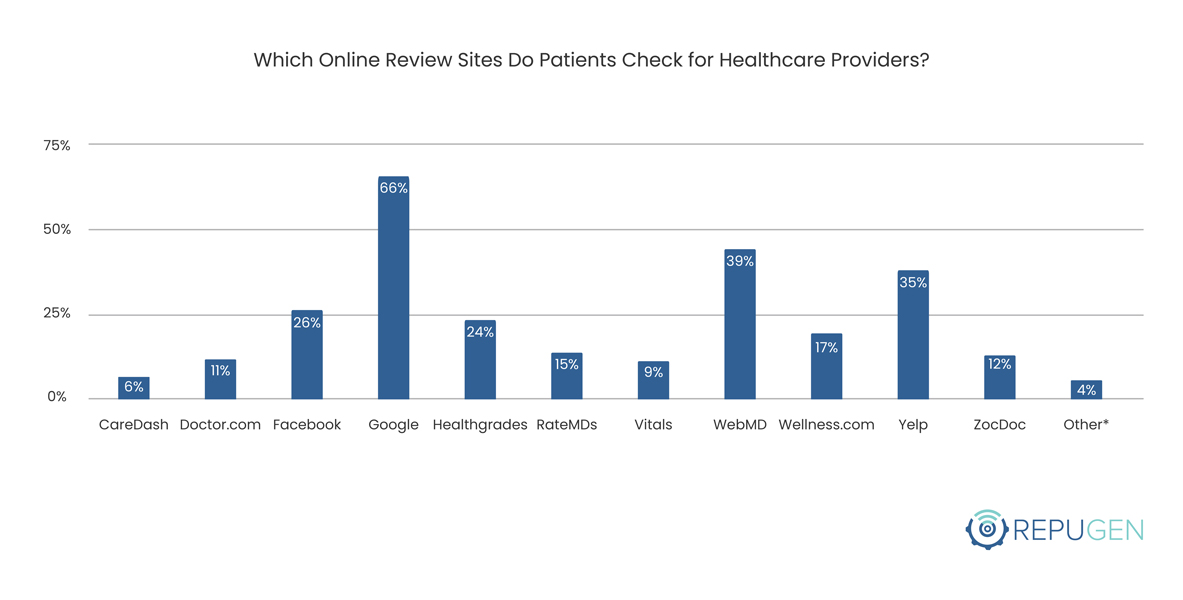
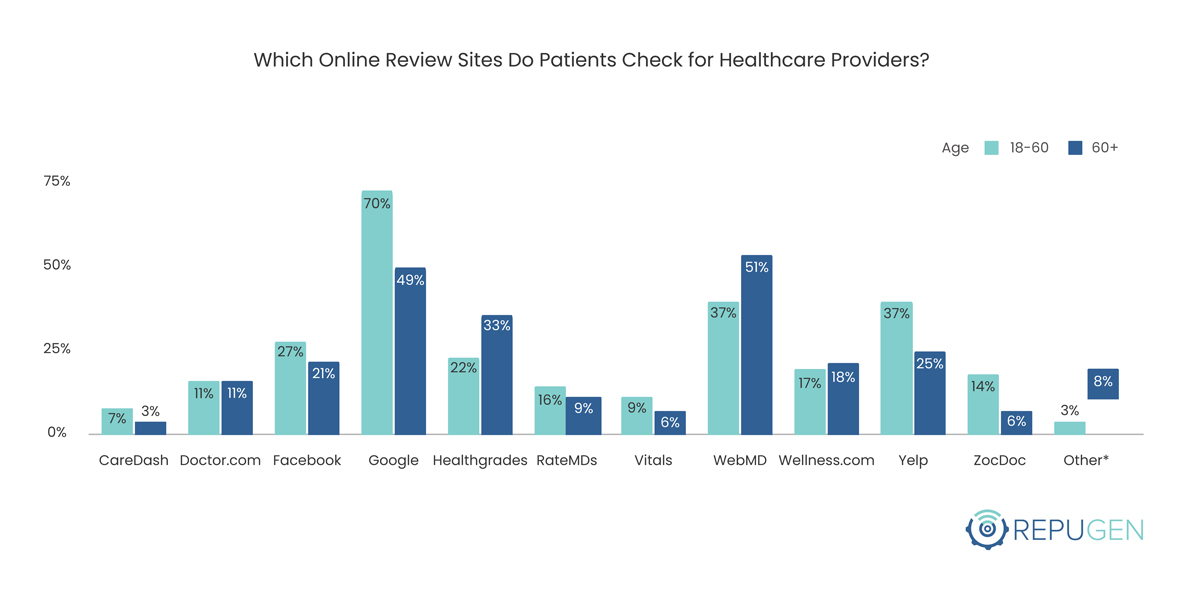
Key Findings
- Google, WebMD, and Yelp are the 3 most checked online review sites and are referred to by 66%, 39%, and 35% of patients, respectively. Interestingly, Yelp has increased its overall market share from 27% in 2020 to 35% in 2021. At the same time, the number of patients checking Google reviews has declined from 76% in 2020 to 66% in 2021. The changes in the figures are indicative of increased reliance on Yelp reviews over those found on Google.
- Google is used more by those under 60, with 70% of the younger patients using Google compared to 49% of the older ones.
- 51% of patients older than 60 use WebMD compared to 37% of younger patients.
- Like Google, Yelp is used more by those under 60, with 37% younger patients using Yelp compared to 25% of patients older than 60.
This shows which review sites are the most popular among patients when selecting a healthcare provider and how important it is for providers to build up their reputation on Google, WebMD, and Yelp.
Which Review Site Do Patients Trust The Most?
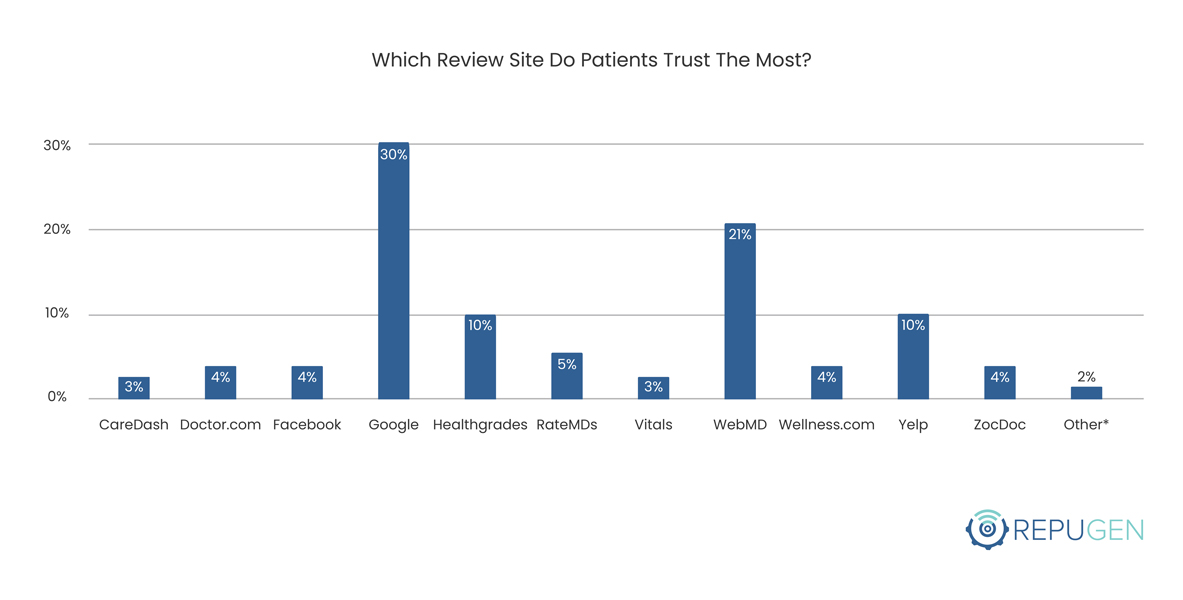
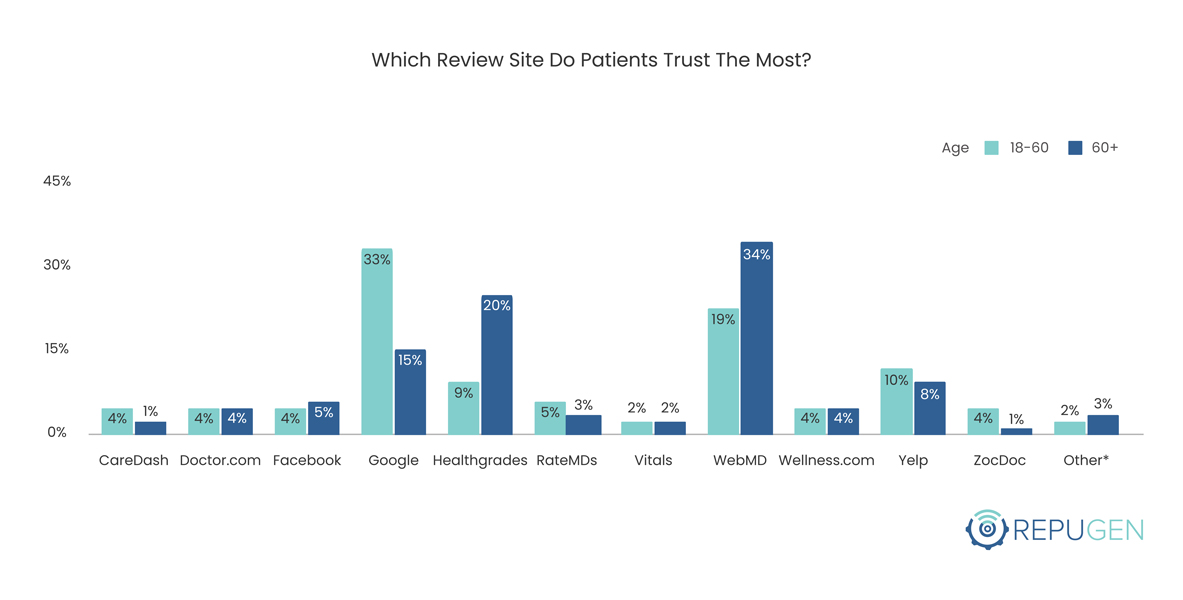
Key Findings
- Google, WebMD, Healthgrades, and Yelp are the most trusted review sites. However, while the trustworthiness of Google and WebMD has declined by 7% and 3%, respectively compared to last year, Yelp has increased in its credibility, with 3% more patients considering Yelp than those in 2020.
- 33% of patients under 60 trust Google, while only 15% of patients over 60 trust Google.
- 34% of patients over 60 trusted WebMD, while only 19% of younger patients trusted it.
- 20% of patients older than 60 trusted Healthgrades, while only 9% of younger patients trusted it.
- 10% of patients aged 18-60 trust Yelp, while 8% of patients older than 60 trust it.
With 81% of the population relying on reviews of healthcare providers in their selection process, the trustworthiness of the review sites indicates that it is vital for providers to plan their online reputation management strategy to align with the review sites' trustworthiness and market share. This shows how important it is for review platforms to build their trust with healthcare providers on their sites.
How Likely Are Patients to Consider Providers Without COVID-19 Health and Safety Measures in Place?
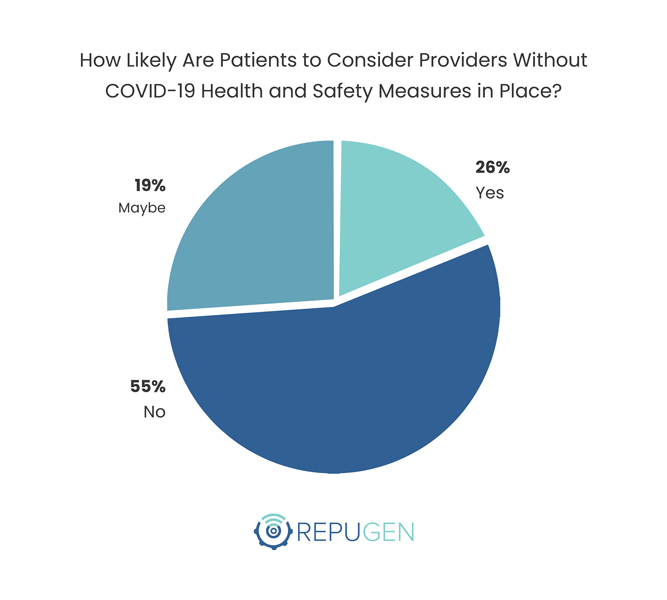
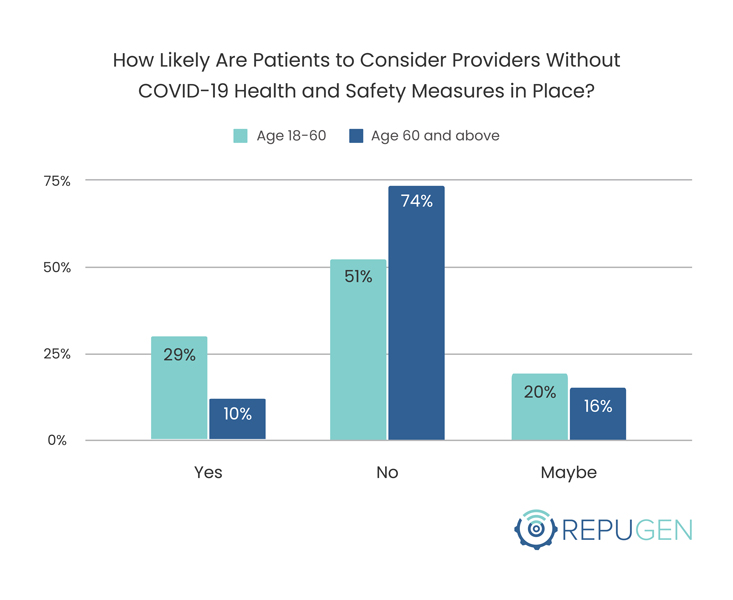
Key Findings
- 55% of patients would not use a healthcare provider/practice if it had no COVID-19 health and safety measures in place.
- 74% of patients ages 60+ say they would not use a provider/practice if these measures are not in place.
- Younger patients are comparatively more lenient, with 29% willing to visit providers with no COVID-19 safety measures in place compared to 10% of patients ages 60+.
The data shows that the implementation of COVID-19 health and safety measures at a providers' physical location plays a crucial role in the patient's healthcare provider selection.
Has COVID-19 Affected the Frequency of Patients’ Visits to Their Healthcare Providers?
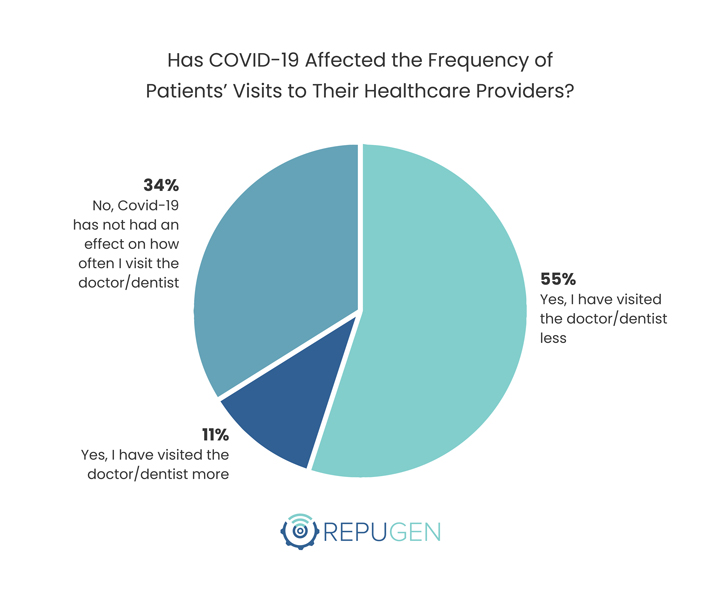
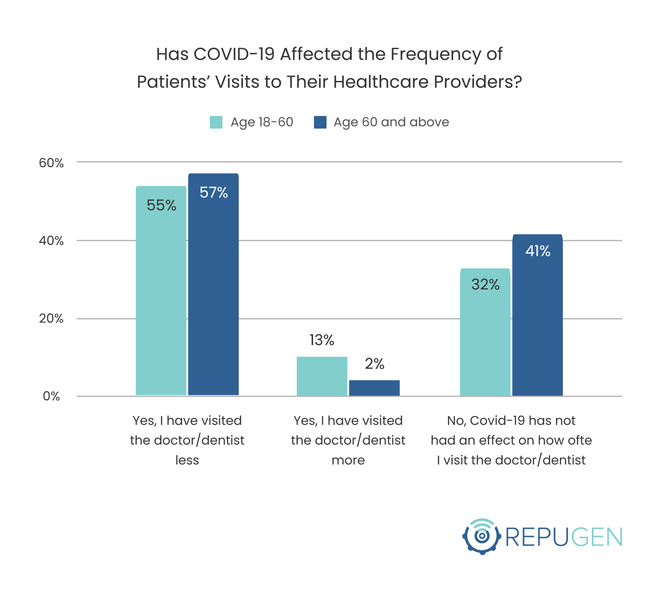
Key Findings
- COVID-19 has influenced patients' visits to their providers, with 55% of them visiting their doctors/dentists less often.
- 34% of patients said that COVID-19 did not influence how often they visited the doctor/dentist.
- 57% of patients aged 60 and above have visited the doctor/dentist less since COVID-19.
- 13% of patients aged 18-60 have visited the doctor/dentist more since COVID-19 compared to only 2% of patients aged 60 and above.
The data shows the effect COVID-19 has had on the frequency of a patient's visit to their doctor/dentist.
What Holds More Weightage- the Doctor's Online Review, the Practice's Review, or Both?
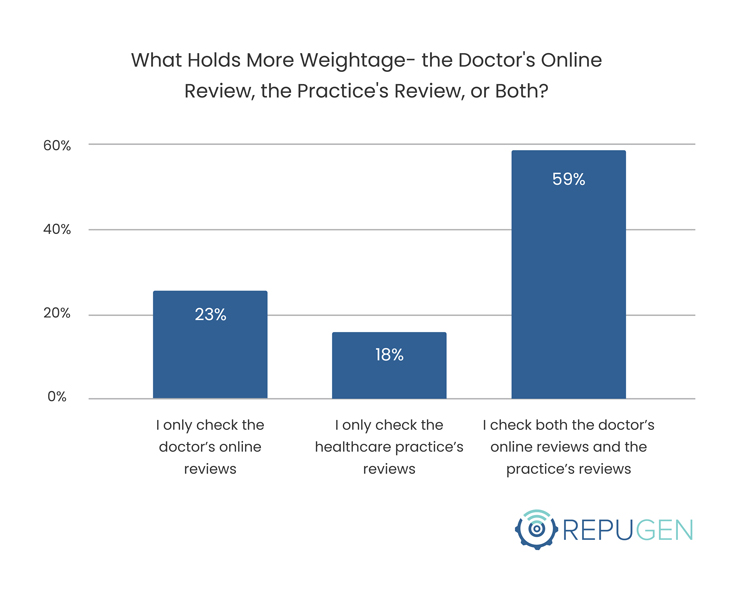
Key Findings
- 82% of patients check online reviews before choosing a healthcare provider.
- Almost 60% of patients check both doctor's online reviews and the practice's reviews when considering a healthcare provider.
The data shows that online reviews for both doctors and practices are very important to patients when considering a healthcare provider.
How Likely Are Patients to Write Reviews for Their Healthcare Providers?
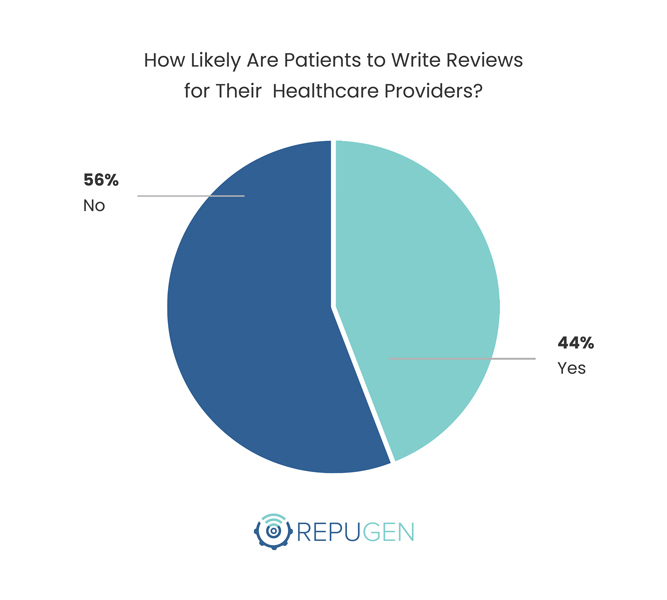
Key Findings
- 56% of patients have not written a review for a healthcare provider or practice.
- 44% of patients have written a review for a healthcare provider or practice.
The data shows even though most patients read reviews before selecting a healthcare provider/practice, less than half of them have written a review.
How Many Patients Expect to Receive a Response to Their Review and What Is the Expected Time Frame of Receiving a Response?
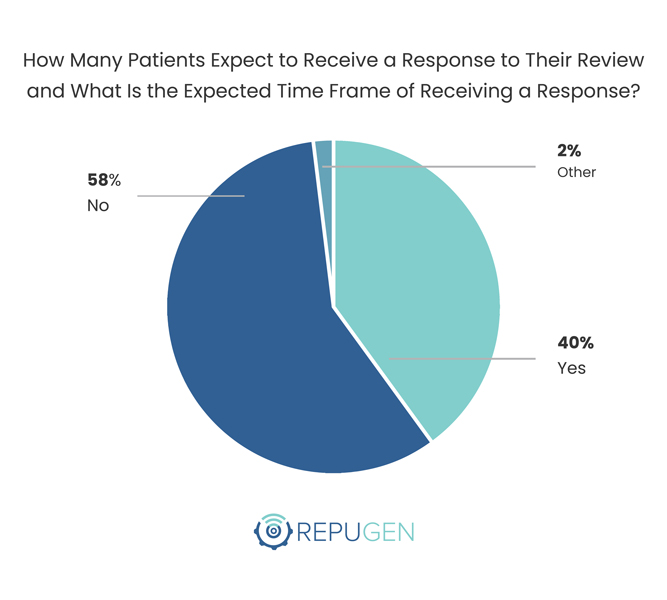
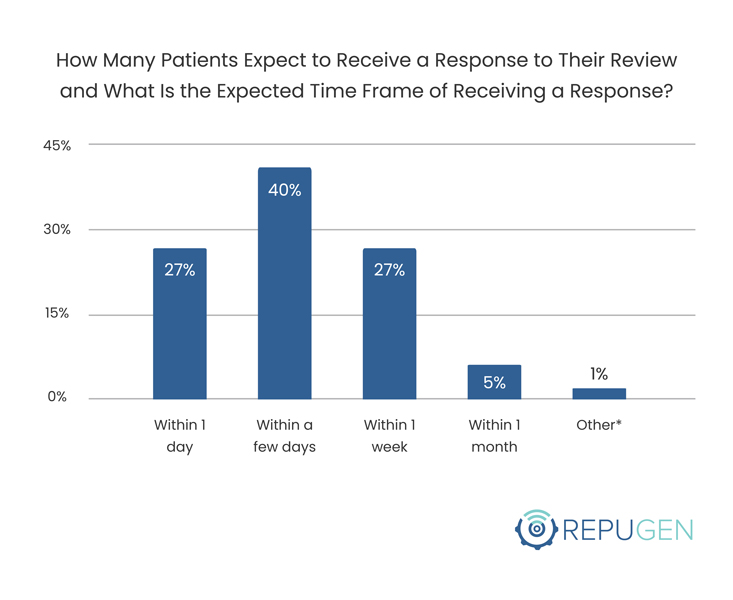
Key Findings
- 58% of patients who have written reviews do not expect to receive a response.
- Among those patients who expect a response to their review, 94 % of them expect to receive it within a week.
- Only 6% of patients who have written reviews expect it to take longer than a week to get a response.
This shows that although more than 50% of patients who have written reviews do not expect any response, those who do expect a response usually expect a response time of less than a week. Therefore, it is important for a provider to respond to a patient's review in a timely manner.
What Are the Modes of Communication Preferred by Patients While Contacting Their Providers?
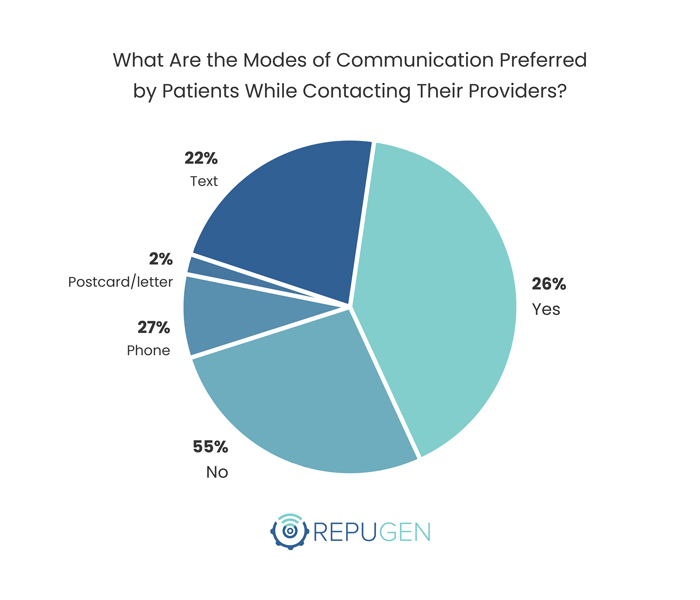
Key Findings
- The patients' most preferred method of communication with their healthcare provider is via email at 41%.
- Communication via phone and text were the 2nd and 3rd most preferred modes, at 27% and 22% respectively.
This shows that most patients are more comfortable using emails, phone calls, and text messages while communicating with their healthcare provider.
Has COVID-19 Affected Patient's Review Consumption Habits?
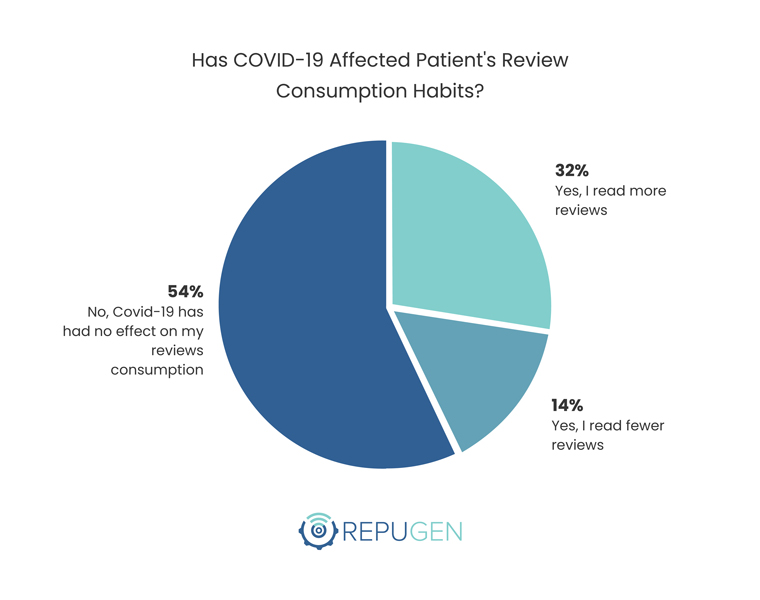
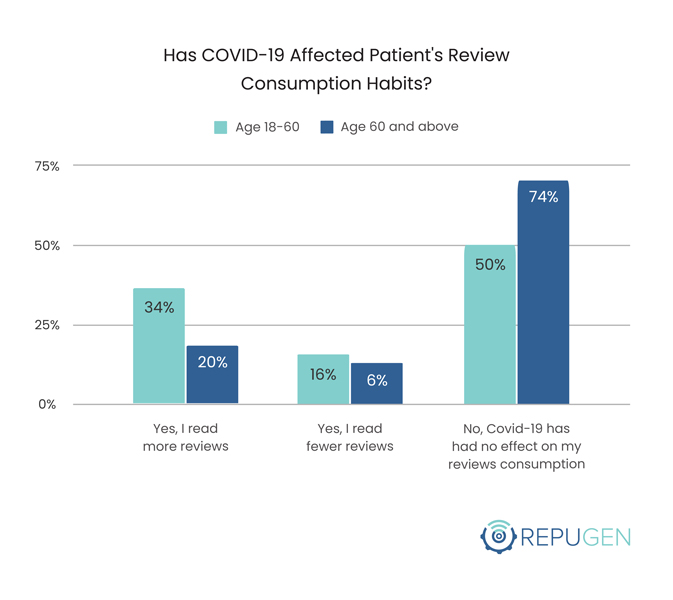
Key Findings
- Over half of the patients said that COVID-19 has not influenced their review consumption.
- 32% of patients have read more reviews because of COVID-19.
- 74% of patients ages 60+ say COVID-19 has not influenced their review consumption compared to 50% of younger patients .
- 34% of patients aged 18-60 have read more reviews because of COVID-19 compared to 20% for patients ages 60+.
This shows how COVID-19 has impacted the review consumption of patients. Interestingly, the pandemic has made patients more aware of the implications of their choices, compelling them to read more reviews and make more informed decisions while selecting their provider/practice.
Does the Age of Review Affect Its Relevance?
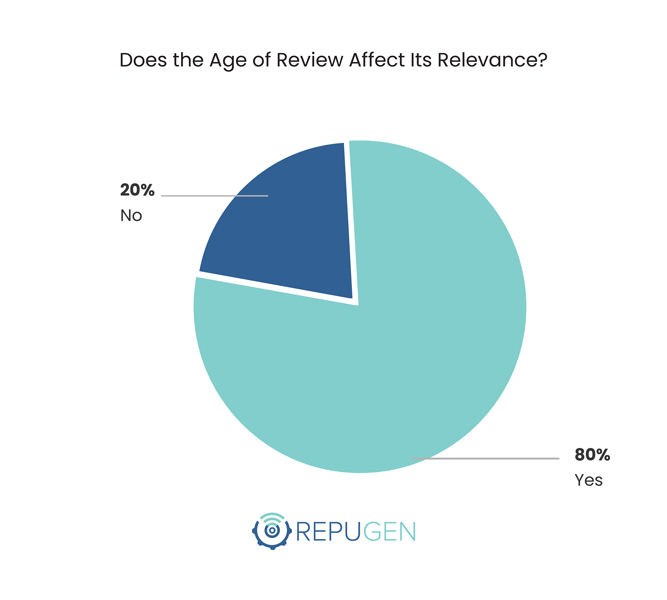
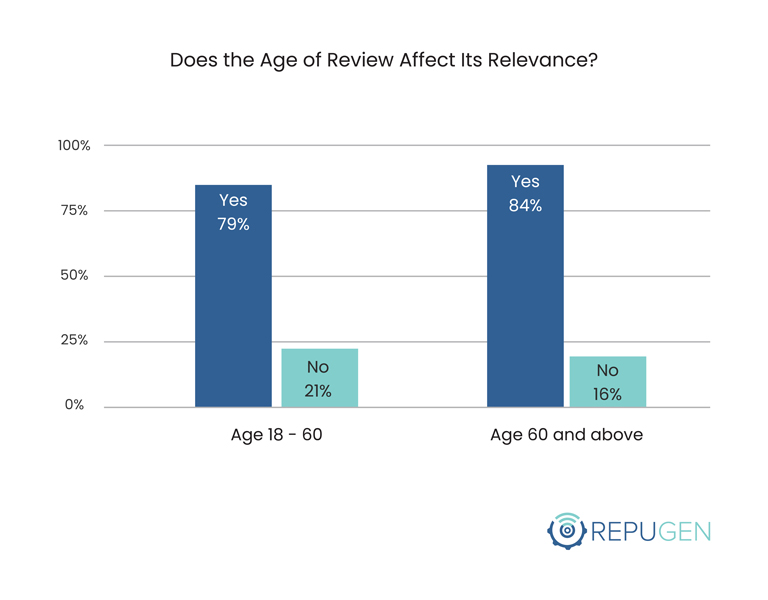
Key Findings
- 80% of patients said that the age of the review affects its relevance, which is 3% higher since 2020
- 84% of patients ages 60+ and 79% of patients younger than 60 find a review’s age relevant in their decision-making.
The data shows that the age of a review plays a crucial role in affecting its relevance, and providers should pay attention to getting reviews on all relevant platforms.
At What Age Is a Review Not Relevant for Patients?
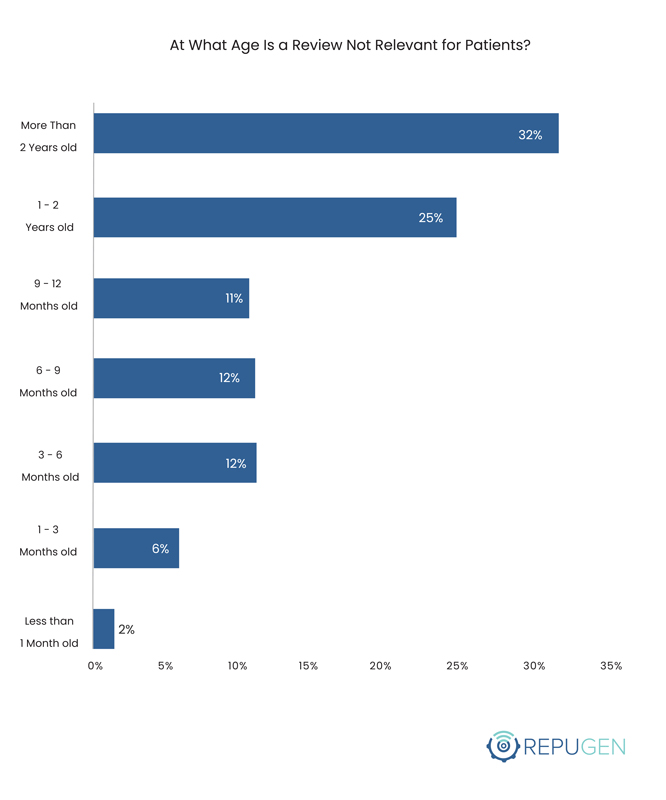
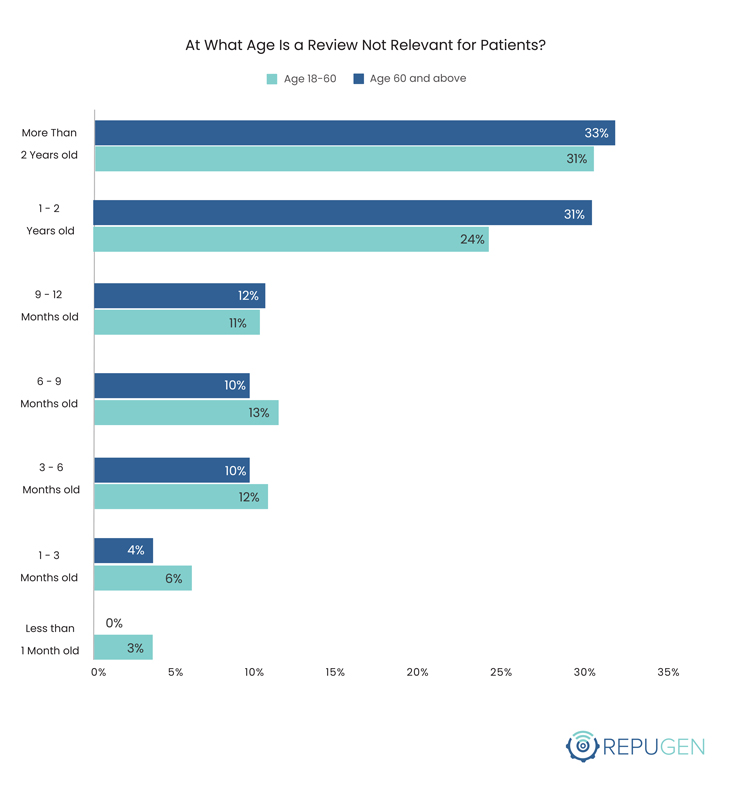
Key Findings
- More than 50% of patients would not trust a review that is older than a year.
- 32% of patients do not trust a review over 2 years old.
- 64% of patients aged 60 and older distrust reviews older than two years compared to 55% of patients under age 60.
The findings show that the age of the review does affect its trustworthiness. The more recent it is, the more patients will trust it. Therefore, providers should work towards getting reviews on a regular basis to increase their trust.
What Is the Minimum Number of Reviews That Patients Check Before Selecting a Healthcare Provider?
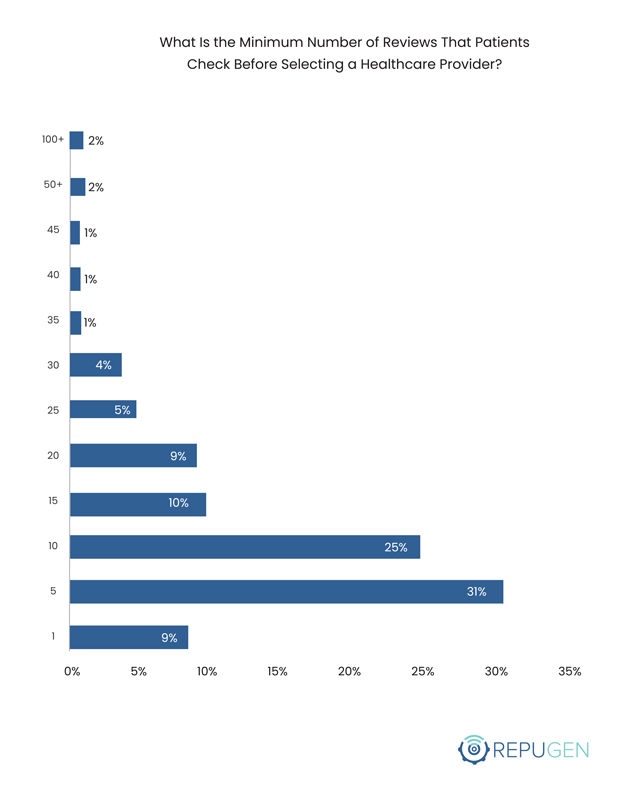
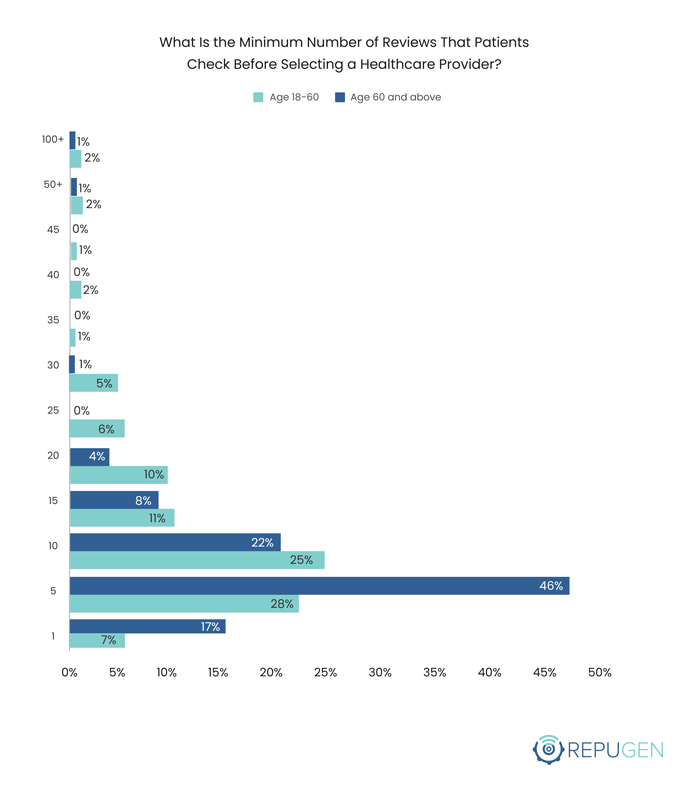
Key Findings
- 60% of patients read ten or more reviews before selecting a healthcare provider.
- 65% of patients under 60 years old read ten or more reviews compared to only 37% of patients over 60 years old.
- 63% of patients over age 60 check less than 10 reviews compared to 35% of patients under 60 years old.
The findings show that the need for providers to have at least 10 reviews is crucial and they should have a strategy for getting more reviews on their services.
What Are the Top 3 Most Important Factors When Selecting a Healthcare Provider?
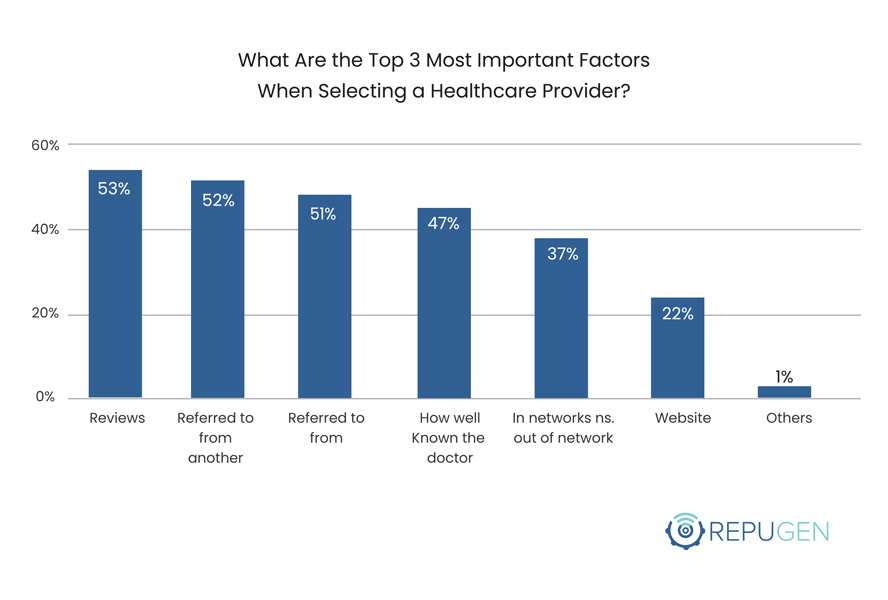
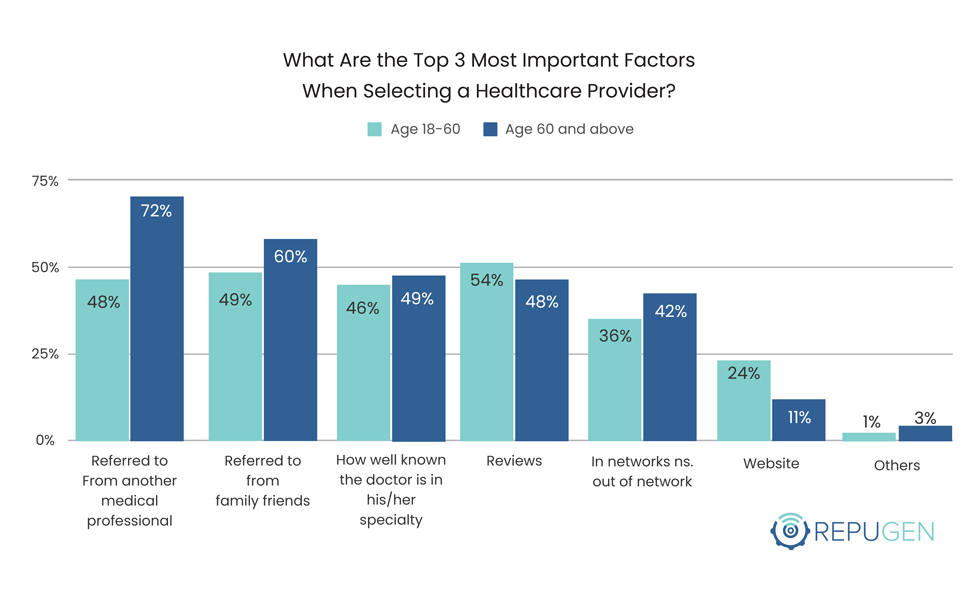
Key Findings
- The top 3 most important factors to patients when choosing a healthcare provider are reviews, followed very closely by referrals from another medical professional and referrals from family/friends.
- 54% of younger patients and 48% of older patients find reviews important
- Referrals from another medical professional or from family/friends are more important to older patients than younger patients.
The findings show that providers need to work on improving their reputations since more patients are comparing them to other providers. They should also focus on improving their patient satisfaction to get more referrals.

